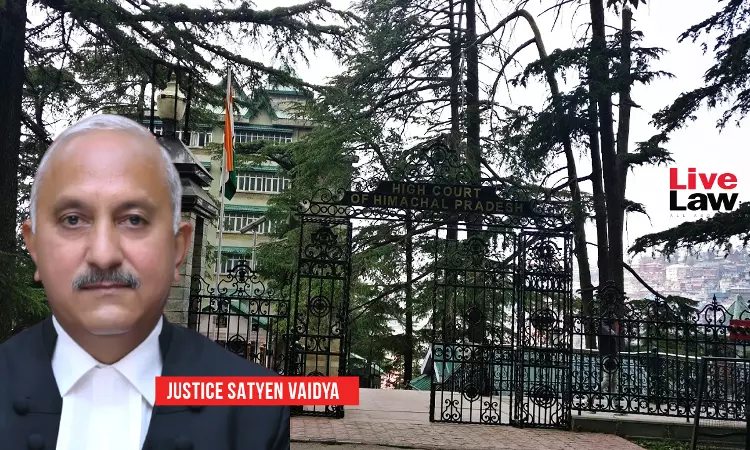- Home
- /
- High Courts
- /
- Himachal Pradesh High Court
- /
- Burden Lies On Employee To Justify...
Burden Lies On Employee To Justify Claim Under 'Equal Pay For Equal Work' Principle: Himachal Pradesh High Court
Mehak Aggarwal
5 Jun 2025 3:25 PM IST
Himachal Pradesh High Court held that when an employee seeks the benefit of principle of equal pay for equal work, it is their duty to submit relevant data to support the claim.Justice Satyen Vaidya: “In order to seek benefits of principle of equal pay for equal work again, the petitioner was required to justify his stand by producing the relevant data” Background Facts:The...
Himachal Pradesh High Court held that when an employee seeks the benefit of principle of equal pay for equal work, it is their duty to submit relevant data to support the claim.
Justice Satyen Vaidya: “In order to seek benefits of principle of equal pay for equal work again, the petitioner was required to justify his stand by producing the relevant data”
Background Facts:
The Petitioner, Surender Verma, was appointed as an Assistant Librarian in the Ayurveda Department at the Rajiv Gandhi Government Post Graduate Ayurvedic College, Paprola in 1997, with a pay scale ranging from ₹1200–2100.
The Assistant Librarians from the Education Department had filed a writ petition before the High Court seeking revision of their pay scales. The writ petition was allowed by the High Court, resulting in a revised pay structure for the department.
Relying on this precedent, the petitioner had filed a writ petition in 2013, contending that he too was entitled to similar benefits as provided to the Assistant Librarians of Education Department. However, his petition was disposed of with a direction to the State of Himachal Pradesh to decide the representation of Petitioner.
The State rejected the petitioner's representation on the ground that the post of Assistant Librarian in the Department of Ayurveda was not equivalent to that in the Education Department. It was asserted that each department operates under its own distinct Recruitment & Promotion Rules as well as service conditions.
Aggrieved by the decision, the petitioner filed the writ petition, stating that his selection process was same as of the Assistant Librarians in the Education Department and he is entitled to the same pay structure as that of the Assistant Librarians in the State's Education Department.
Contentions of the State:
In response, the State argued that the Recruitment and Promotion Rules of Assistant Librarians in the Department of Ayurveda were distinct from the Education Department. It was further stated that at the time of petitioner's appointment, his pay scale was between ₹1200–2100, which was later revised to ₹4020–6200, and subsequently to ₹5910–20200.
Given these structural and regulatory differences, the State submitted that the petitioner could not seek parity with Assistant Librarians working under an entirely different set of rules in the Education Department.
Findings:
The court remarked that in Principal Secretary Personnel Vs Partap Thakur, 2014 the H.P. Court settled “that parity of pay scale can't be claimed on the sole ground of similarity in designation. For drawing parity between posts with same designations in different departments or organizations as also for attracting the doctrine of equal pay for equal work, there has to be quantified data as to nature of duties, recruitment and promotion rules, initial qualification and mode of selection etc.”
Additionally, In Bhagat Ram & ors. V/s State of H.P. & Ors, 2023, the H.P. High Court stated that “the principle of 'equal pay for equal work' is applicable only when it is clearly established that the duties and responsibilities of the concerned posts are substantially similar. Without such a comparison, especially when the posts are in different departments or organizations governed by separate sets of rules, no case for pay parity arises”.
Therefore, the Court observed that in this case, the petitioner had failed to provide any such data or evidence to support his claim. It emphasized that mere similarity in designation of posts was insufficient.
It further stated that for seeking benefits of equal pay for equal work, the petitioner had to justify his stand by giving relevant data, as the grant or withdrawal of pay scales to employees is the right of State Government.
The pay scales are determined by expert committees considering multiple factors, and courts, while exercising writ jurisdiction, can't substitute such expert assessments unless gross injustice is evident.
Moreover, the Court noted that the petitioner had accepted his appointment in the Department of Ayurveda under the existing Recruitment & Promotion Rules and was well aware of the associated pay scale. Therefore, having voluntarily accepted the terms of employment, he could not now claim parity with another department based solely on a later development.
In light of the above findings, the Court dismissed the writ petition, holding that the petitioner had not substantiated his claim with the requisite material to invoke the principle of equal pay for equal work.
Case Name: Surender Verma v/s State of H.P. & Ors.
Case No.: CWPOA No. 1720 of 2020
Date of Decision: 20.05.2025
For the petitioner : Mr. Sandeep K. Pandey, Advocate.
For the respondents : Mr. Gautam Sood, DAG.



